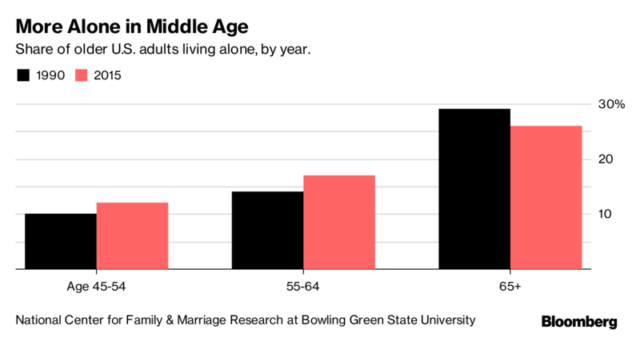Growing old and alone is one of the new aging dilemmas Americans face today. More Americans live alone today due to several reasons. One is the fact that almost half of U.S adults are single. Another is that Americans wait too long before they get married. Another factor is about half of marriages end in divorce.

To address the issue of growing older and living alone, we handpicked five articles that can help Americans plan for their future alone.
Advantages of Aging Alone
Growing older with no family members to rely on is considered as a disadvantage. However, this is not really the case as long as you look at the brighter side. Yes, there is a silver lining in being a “solo ager” according to Laura Dixon of Caring.com. She highlighted valid points that, growing old and childless is advantageous in her article, “Childfree Seniors: Taking the Future into Your Own Hands.” One is that childfree seniors will never have to shoulder the cost of childrearing, which has an average cost of $245,000 per child from birth until the age of 18. Another valid point is that childfree seniors have more freedom in choosing where they want to spend their retirement compared to those with families. It is also easy for old people living alone to develop strong bonds with friends and close relationship with their younger relatives.
Read: National Senior Independence Month: 15 Insider Tips for Independent Senior Living
How to Thrive as An Elder Orphan
Carol Marak’s optimism in being alone in her article, “How to Thrive When Aging Alone,” is very inspiring. She even created a Facebook group for elder orphans who need help in finding affordable housing, help after surgery, isolation, social engagement and other issues surrounding old people who live alone.
Aside from her Facebook group that has over 4,000 members, she also shared other things that can help elder orphans thrive like by being clear about how you want to live, forgiving yourself, understanding your needs allows you to live genuinely the life you want and by accepting who you really are.
Carol’s life lessons have helped her become more positive in life and to look forward to her future. Through her accounts, she hopes that other older people will find aging alone as a blessing and be more optimistic about their future.
Read: 5 Effective Ways Elder Orphans Plan for Aging
Who Will Take Care of Me When I’m Old and Alone?
Sally Abrahms shared different ways to prepare for the future if you are single and without a child in her article, “Single and Older: Who Will Take Care of Me?” Aging is challenging especially if you are alone. Today, there are a lot of Americans who will most likely grow old alone according to these facts and figures:
- The number of older adults 45-54 who never married increased by 300% between 1986 and 2009.
- The divorce rate for people who are 50+ doubled between 1990 and 2010.
- Baby boomers will be most likely to be divorced.
- 1 in 3 baby boomers is single.
- Single baby boomers usually live alone.
It’s important to create a plan for how you want to live your life in 5 or 10 years. Identifying people who can be your support system is imperative to make sure that you have someone to call or rely on when you’re sick, or you need assistance with something. Consulting a professional is also recommended to make sure that you have all the legal documents you need and you are financially ready for expenses like healthcare or long-term care.
Interesting Facts about Senior Isolation
Sarah shares interesting facts about feelings of loneliness and isolation, which can be used to prevent senior isolation. According to her article, “20 Facts about Senior Isolation That Will Stun You,” living alone is a predisposing factor of the feeling of isolation among old people. One of the culprits for isolation is the decrease in social engagement as people grow older rooted in different factors including the death of family or friends, retirement or lack of mobility.
The consequences of isolation are alarming and harmful. To prevent this, people should be more aware of the risks, causes, and effects of loneliness in seniors like increasing the risk of mortality, negative effect on physical and mental health and making seniors more vulnerable to elder abuse.
Can Aging in Place Be Harmful?
Aging in place is popular among seniors today. In fact, 87% of seniors prefer to age in place. Older people prefer to age at home because it is comfortable and a cheaper option compared to moving to long term care facilities. But is it really a good idea to age in place?
According to Kristin Hicks of SeniorAdvisor.com, aging in place can be harmful to seniors. Her article, “The Dark Side of Aging in Place,” reveals five ways aging in place can be risky for seniors. Kristin highlights the importance of mobility and social engagement that are affected by aging in place and recommended to try other options like assisted living in case staying at home is starting to turn into a nightmare.
Additional Thoughts on Growing Older and Alone
There are solo agers that are still in denial about the need to plan for their long term care needs and care arrangements. They need enlightenment and guidance on how to plan for their future care needs.
Those who are growing old and alone should embrace the importance of long term care planning as early as possible and have long-term care insurance that can help pay for their ltc needs.
These people are the ones who should plan early since they don’t have a family member they can rely on in case they will need assistance in carrying out their daily living activities.

